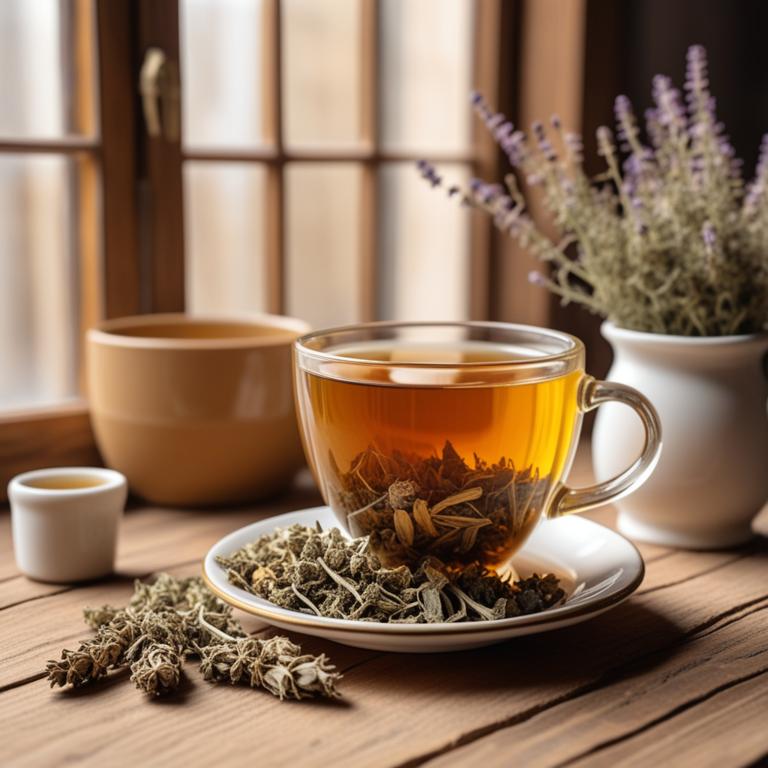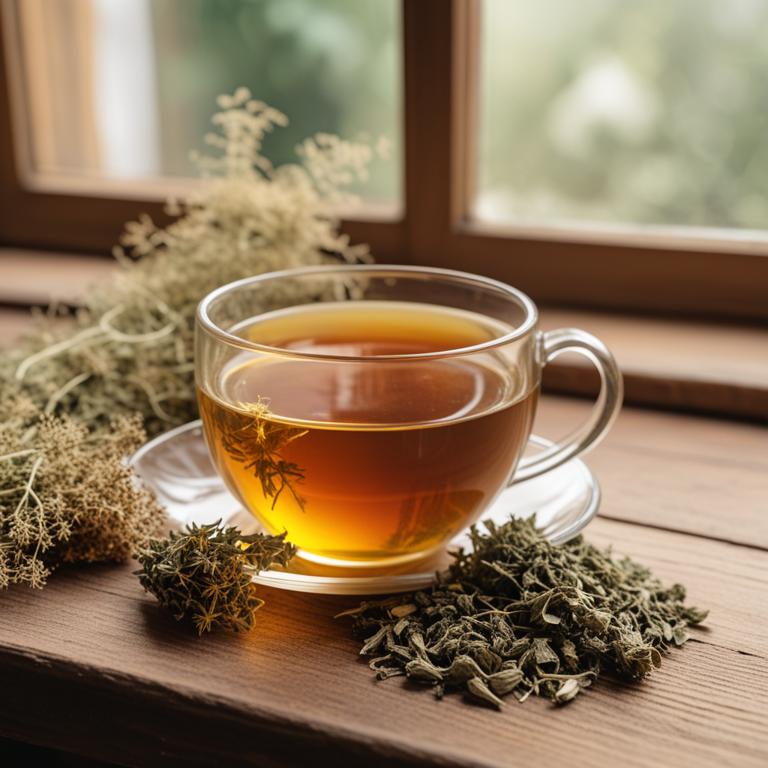7 Best Herbal Teas For Phlegm

Herbal teas for Phlegm are a natural remedy that involves the consumption of specific herbal teas to help alleviate the symptoms of excess mucus or phlegm production in the body.
These teas are beneficial as they help to thin out mucus, reduce congestion, and soothe the respiratory system, making it easier to breathe and recover from respiratory issues.
Some examples of herbal teas used to treat phlegm include ginger tea, which helps to reduce inflammation and thin out mucus, eucalyptus tea, which opens up airways and eases congestion, peppermint tea, which helps to loosen and clear out mucus, and thyme tea, which has antibacterial properties and can help to combat infections.
Additionally, licorice root tea, marshmallow root tea, and slippery elm tea are also commonly used to treat phlegm, as they help to soothe and protect the mucous membranes, reducing inflammation and promoting healing.
According to "Journal of alternative and complementary medicine (New York, N.Y.)", teas for phlegm, such as Throat Coat, have been found to be effective in providing rapid, temporary relief of sore throat pain in patients with pharyngitis.
Below there's a list of the 7 best herbal teas for phlegm.
- 1. Eucalyptus globulus teas
- 2. Glycyrrhiza glabra teas
- 3. Mentha x piperita teas
- 4. Zingiber officinale teas
- 5. Ligusticum wallichii teas
- 6. Echinacea purpurea teas
- 7. Thymus vulgaris teas
Also you may be interested in...
TODAY'S FREE BOUNDLE
Herb Drying Checklist + Herbal Tea Shopping List + Medicinal Herbs Flashcards
Enter you best email address below to receive this bundle (3 product valued $19.95) for FREE + exclusive access to The Aphotecary Letter.
$19.95 -> $0.00
1. Eucalyptus globulus teas

Eucalyptus globulus teas have been traditionally used to treat phlegm ailments due to their decongestant and expectorant properties, which help to loosen and clear mucus from the respiratory system.
The bioactive constituents of Eucalyptus globulus, including eucalyptol and cineole, possess anti-inflammatory and antimicrobial properties that contribute to its therapeutic effects.
By reducing inflammation and fighting off infections, Eucalyptus globulus teas help to alleviate symptoms such as coughing, congestion, and difficulty breathing associated with phlegm ailments.
The benefits of using Eucalyptus globulus teas to treat phlegm ailments include quick relief from symptoms, improved respiratory function, and a reduced risk of complications such as bronchitis and pneumonia.
Related Study
According to "Zhongguo Zhong yao za zhi = Zhongguo zhongyao zazhi = China journal of Chinese materia medica", Eucalyptus globulus teas for phlegm may be beneficial in reducing mucin content and hypersecretion of airway mucins.
2. Glycyrrhiza glabra teas

Glycyrrhiza glabra teas, also known as licorice root tea, have been traditionally used to treat phlegm ailments due to their expectorant properties, which help to loosen and clear mucus from the lungs and airways.
The bioactive constituents of Glycyrrhiza glabra, including glycyrrhizin, flavonoids, and saponins, contribute to its therapeutic effects by reducing inflammation and promoting the clearance of phlegm.
By promoting the expectoration of phlegm and reducing inflammation, Glycyrrhiza glabra teas help to alleviate symptoms of phlegm ailments, such as coughing and congestion.
The benefits of using Glycyrrhiza glabra teas to treat phlegm ailments include reduced symptoms, improved lung function, and a boost to the immune system, making it a popular natural remedy for respiratory health.
Related Study
According to the study, Glycyrrhiza glabra teas for phlegm were found to have a more potent antitussive effect on coughs induced by citric acid than other medicinal plants.
3. Mentha x piperita teas

Mentha x piperita teas, commonly known as peppermint tea, have been traditionally used to treat phlegm ailments such as congestion and coughs due to its decongestant and expectorant properties.
The herbal preparation helps to treat this ailment by loosening and clearing mucus from the airways, making it easier to breathe and relieving congestion.
The bioactive constituents of peppermint tea, including menthone, menthol, and limonene, contribute to its therapeutic effects by reducing inflammation, opening airways, and relieving coughs.
Regular consumption of peppermint tea has been shown to provide benefits in treating phlegm ailments, including rapid relief from congestion, improved respiratory function, and a reduced risk of respiratory infections.
Related Study
According to "BioMed research international", Mentha x piperita teas, which are part of the plant Mentha piperita, have significant potential therapeutic activity for respiratory disease.
4. Zingiber officinale teas

Zingiber officinale teas, also known as ginger tea, have been traditionally used to treat the phlegm ailment due to their anti-inflammatory and expectorant properties.
The bioactive constituents of ginger tea, such as gingerols and shogaols, help to break down and expel mucus from the respiratory tract, relieving congestion and cough.
By reducing inflammation and promoting mucus clearance, ginger tea helps to alleviate symptoms associated with the phlegm ailment, including cough, fever, and difficulty breathing.
The benefits of using ginger tea to treat the phlegm ailment include its natural and non-addictive properties, making it a safe and effective alternative to conventional medications.
Related Study
According to the provided study, Zingiber officinale teas for phlegm, as part of traditional Chinese medicine, may be a safe and effective alternative for the treatment of upper airway cough syndrome (UACS), which often involves phlegm.
5. Ligusticum wallichii teas

Ligusticum wallichii teas, also known as Chuanxiong or Szechuan lovage, have been traditionally used to treat the phlegm ailment, particularly in Chinese medicine.
The herbal preparation is attributed to its warming, dispersing, and unblocking properties that help to eliminate stagnation and promote the free flow of qi and blood, thereby alleviating symptoms associated with phlegm accumulation.
The bioactive constituents of Ligusticum wallichii teas, including volatile oils, flavonoids, and sesquiterpenes, are responsible for its therapeutic effects, including anti-inflammatory, antispasmodic, and expectorant properties that help to thin and clear phlegm.
By promoting the digestion of food, relieving cough and wheezing, and eliminating phlegm, Ligusticum wallichii teas provide relief from phlegm-related ailments and support overall respiratory health.
6. Echinacea purpurea teas

Echinacea purpurea teas have been traditionally used to treat phlegm ailments due to their anti-inflammatory and immunomodulatory properties.
The bioactive constituents, including alkylamides, caffeic acid derivatives, and flavonoids, help to reduce inflammation and modulate the immune system, thereby alleviating symptoms associated with phlegm.
These herbal preparations have been shown to help treat phlegm by thinning mucus, reducing congestion, and promoting a healthy immune response.
The benefits of using Echinacea purpurea teas to treat phlegm include reduced symptoms, improved respiratory function, and enhanced overall well-being.
Related Study
According to the information provided, Echinacea purpurea teas have potential for adjuvant symptomatic therapy in respiratory conditions, such as cough, which is associated with phlegm, among other respiratory issues.
7. Thymus vulgaris teas

Thymus vulgaris teas, also known as thyme tea, have been traditionally used to treat phlegm-related ailments due to their expectorant and anti-inflammatory properties.
The bioactive constituents, including thymol and carvacrol, help to break down and eliminate excess mucus, thereby alleviating respiratory issues such as coughs and congestion.
Thymus vulgaris teas help to treat phlegm by thinning mucus and making it easier to expel, promoting a clearer respiratory tract and relieving discomfort.
The benefits of thymus vulgaris teas in treating phlegm include reduced coughing, improved breathing, and a decrease in inflammation, making it a natural and effective remedy for respiratory health.
Related Study
According to "Wiadomosci lekarskie (Warsaw, Poland : 1960)", Thymus vulgaris teas for phlegm are beneficial due to its spasmolytic properties, which can help alleviate cough and dyspnea associated with upper respiratory tract infections.